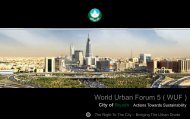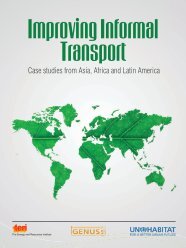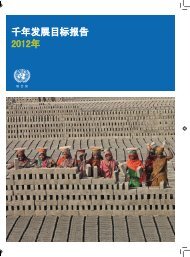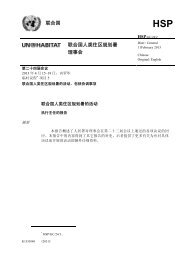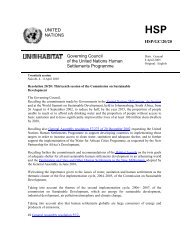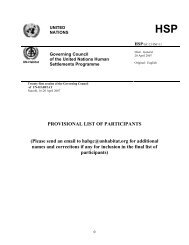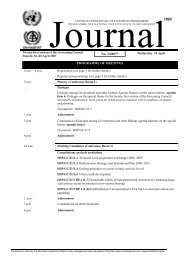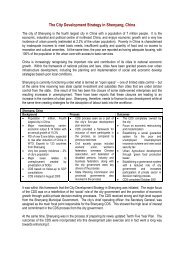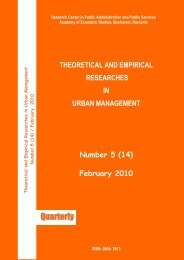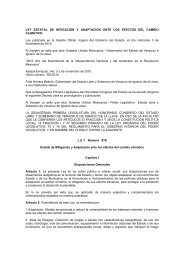Harmonious cities - UN-Habitat
Harmonious cities - UN-Habitat
Harmonious cities - UN-Habitat
Create successful ePaper yourself
Turn your PDF publications into a flip-book with our unique Google optimized e-Paper software.
IN-FOCUS Water<br />
28<br />
Ksar Ghiléne, in Tunisia, uses photovoltaic solar energy to power its desalination plant<br />
the WWF believes that the impact these<br />
plants can lead to brine build-up, increased<br />
u r b a n<br />
WORLD<br />
November 2008<br />
Ph o t o © in S t i t u t o te C n o l ó g i C o d e CA n A r i A S<br />
greenhouse gas emissions, destruction of<br />
prized coastal areas and reduced emphasis<br />
Mobile solutions to meet growing water needs<br />
in UAE, Oman and Qatar<br />
With increasing populations, heavy<br />
demands on infrastructure and energy,<br />
and one of the highest water consumption<br />
rates in the world, the Middle East<br />
and North Africa are under pressure. By<br />
2010 the regions thirst is set to increase<br />
to 8.8 billion cubic metres a year. General<br />
Electric and Septech have recently<br />
signed agreements with the United Arab<br />
Emirates, Oman and Qatar to meet this<br />
demand by providing mobile water systems<br />
for the next 20 years.<br />
Housed in a 12-metre mobile container, the<br />
units are easily deployable and through reverse<br />
osmosis technology can treat brackish, salt and<br />
wastewater and produce from 1,000m 3 per day.<br />
The mobile units are able to meet all regulatory<br />
requirements around the world and can<br />
operate independently of a power source. “They<br />
are not limited exclusively to unplanned emergency<br />
situations, rather they present solutions<br />
for a range of additional service scenarios. The<br />
units are able to be rapidly deployed and in op-<br />
The 12-metre mobile containers can produce 1,000m 3 of water each day Ph o t o © SeP t e C h<br />
on conservation of rivers and wetlands.<br />
“Many of the areas of most intensive desalination<br />
activity also have a history of damaging<br />
natural water resources, particularly<br />
groundwater,” says Jamie Pittock, Director<br />
of WWF’s Global Freshwater Programme.<br />
“Large desalination plants might rapidly<br />
become ‘the new dams’ and obscure the importance<br />
of real conservation of rivers and<br />
wetlands.”<br />
While is generally agreed that desalination<br />
plants make sense as one of part of the<br />
solution to water supplies along with conservation,<br />
the World Wildlife Fund believes<br />
that they have a limited role in water supply.<br />
“Simultaneously there needs to a substantial<br />
commitment to research into potential, longterm<br />
cumulative impacts of an industry that<br />
is rapidly scaling up its presence in many areas<br />
of the world,” concludes the WWF report<br />
on desalination.<br />
eration within short periods of time and<br />
are able to treat sea, brackish and treated<br />
sewage effluent,” says Ashruf Kamel<br />
Chief Strategy Officer for Septech.<br />
“With the global consumption of water<br />
doubling every 20 years, it has been<br />
estimated that by 2025 more than one<br />
third of the world’s population will not<br />
have adequate access to drinking water,”<br />
adds Kamel. “These alarming figures do<br />
not even encompass the growing industrial<br />
demand for water supply.”<br />
To date the technology has successfully<br />
been deployed for a variety of desert-<br />
based mega projects, delivering water<br />
quantities from 1,000m 3 to 10,000m 3 .<br />
Without any current municipality infrastructure<br />
in place, the units have<br />
ensured that developers can commence<br />
with construction and deliver their<br />
projects according to timelines set.<br />
“Whether for domestic or industrial<br />
application, our mobile water systems<br />
are capable of suiting the needs of multiple<br />
industries including; construction,<br />
power, chemical processing, pharmaceuticals<br />
and food and transport,” explains<br />
Kamel.<br />
Septech is sending more than one<br />
hundred units to the region and is<br />
attracting interest from Turkey, Libya<br />
and Australia in 2009. u



